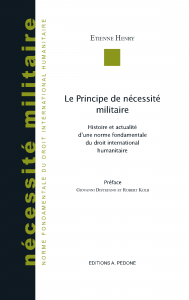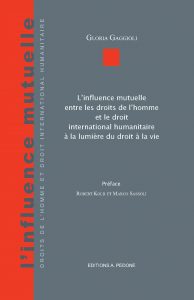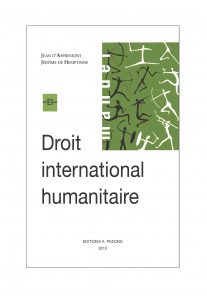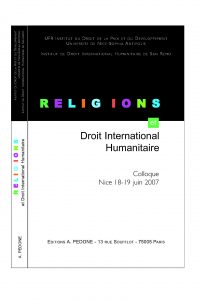Principe de nécessité militaire (Le)
Histoire et actualité d'une norme fondamentale du droit international humanitaire
Etienne Henry
Quatrième de couverture
Le présent ouvrage s’attache à analyser la portée du principe de nécessité militaire principalement à travers l’analyse des sources conventionnelles et de la pratique internationale. La richesse du matériau examiné permet d’attester du caractère de droit positif du principe, dont la portée est d’interdire tous les actes de belligérance qui ne sont pas strictement nécessaires pour atteindre un avantage militaire légitime.
Cette fonction prohibitive s’observe très tôt dans l’évolution historique du droit de la guerre. Contrairement à ce qui est parfois prétendu, le principe de nécessité militaire est en outre dénué de toute fonction dérogatoire. Il doit ainsi être distingué de la notion d’état de nécessité, propre au droit de la responsabilité « civile » ou pénale. Ainsi, malgré certaines résurgences éphémères, notamment dans le contexte de la mal nommée « guerre globale contre le terrorisme », la doctrine de la « raison de guerre » ou Kriegsraison, n’a jamais eu pignon sur rue.
L’analyse systématique des rapports entre le droit international humanitaire et d’autres branches du droit conduit à la réfutation des théories qui confèrent à la notion de nécessité militaire la faculté d’agir comme une source d’autorité juridique pour les belligérants, et donc de légitimation de la violence guerrière.
Jusqu’à la fin du XIXème siècle, le principe a joué un rôle central dans le cadre d’un droit avant tout coutumier, non écrit, marqué par son insécurité juridique. Dans le contexte actuel, caractérisé par un droit largement codifié, le principe de nécessité militaire trouve surtout son expression dans de nombreuses règles spécifiques. Au-delà de celles-ci, sa portée précise fait débat, en particulier en ce qui concerne la pratique controversée des exécutions ciblées. Les arguments sont toutefois nombreux, qui militent en faveur d’une application autonome du principe ayant pour effet de proscrire toute pratique militairement non nécessaire.
À propos de l'auteur
Etienne Henry est docteur en droit de l'Université de Neuchâtel. Il mène actuellement un projet de recherche postdoctorale financé par le Fonds national suisse de la recherche scientifique. Il a effectué des séjours scientifiques à l'Académie de droit international humanitaire et des droits humains de Genève, à l'Université libre de Bruxelles et au College of Law de l'Australian National University de Canberra. L'essentiel de cet ouvrage a été réalisé pendant qu'il travaillait en tant qu'assistant-doctorant et chargé d'enseignement à la chaire de droit international public de l'Université de Neuchâtel.Etienne HENRY holds a PhD in law from the University of Neuchâtel. Currently he is undertaking a postdoctoral research project funded by the Swiss National Science Foundation. He has recently been a visiting researcher at the Geneva Academy of International Humanitarian Law and Human Rights, the Free University of Brussels (ULB), and the College of Law of Australian National University in Canberra. Most of the research and writing of this book was realised when he worked as teaching and research assistant and lecturer for the Chair of Public International Law at the University of Neuchâtel.
Détails de l'ouvrage
This book aims to analyse the scope of the principle of military necessity, mainly through the scrutiny of treaty sources and international practice. The richness of the examined materials attests to the positivity of the principle, the scope of which is to prohibit all belligerent acts that are not strictly necessary in order to reach a legitimate military advantage.
This prohibitive function can be observed very early in the evolutionary process of the law of war. Contrary to a commonly shared belief, the principle of military necessity is devoid of any derogatory function. It should therefore be distinguished from the notion of the state of necessity which relates to the law of responsibility, either “civil”, or criminal. Despite some ephemeral resurgences, especially in the context of the ill-termed “global war against terror”, the doctrine of the “reason of war”, or Kriegsraison, was never broadly accepted.
The systematic analysis of the relations between international humanitarian law and other branches of international and domestic law leads to the refutation of the theories that confer to the notion of military necessity the faculty to act as a source of legal authority for the belligerents. As a consequence, the old critique that reproaches the law of armed conflict to act as a factor of legitimation of violence is partly misplaced.
Until the end of the 19th century, the principle of military necessity has played a central role in the framework of a legal system made of primarily of unwritten customary law and marked by a lack of legal certainty. In the present context, characterized by a largely codified law, the principle finds its expression especially through numerous specific rules. Beyond these, its precise scope is subject to debate, in particular in regards to the controversial practice of targeted killing. There are numerous arguments arguing in favour of an autonomous application of the principle that would have the effect of banning any practice that proves militarily unnecessary, even in the absence of explicit special rules.










